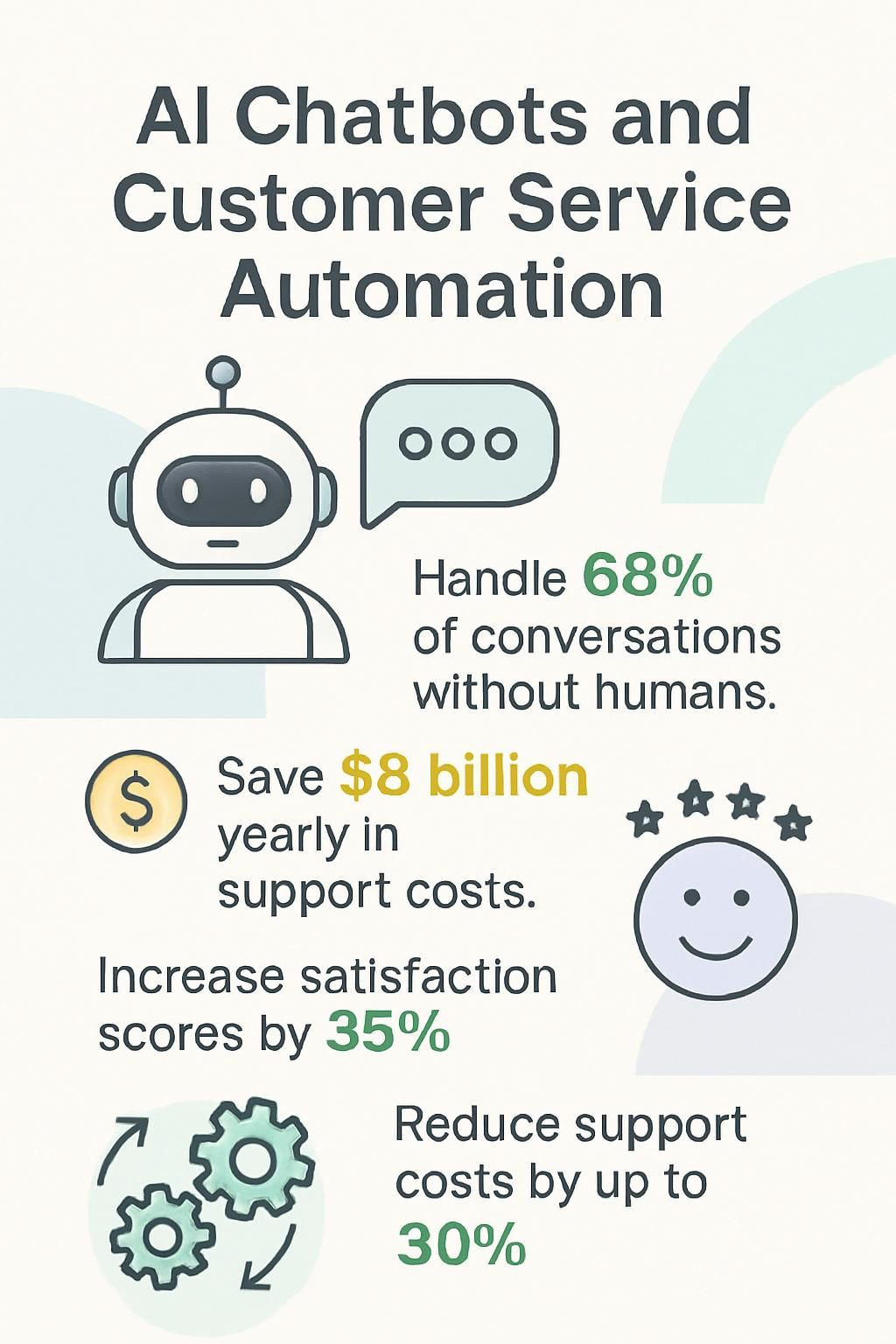AI Chatbots and Customer Service Automation


Understanding AI Integration

AI chatbots have transformed modern customer service by handling 60-80% of routine questions without human help. These digital assistants use natural language processing (NLP) to understand customer needs and provide instant answers.
These Conversational Agents provide Realtime Assistance and integrate with Ticketing Systems and SelfService Solutions, enhancing Automated Support and improving overall User Experience.
The customer service landscape faces major challenges: slow response times, high costs, limited support hours, and generic interactions.
Businesses are racing to solve these problems, with 80% expected to adopt AI chatbots by the end of 2024 according to Salesforce.
Customer expectations have changed dramatically. Today, 74% of consumers expect to find chatbots on company websites, and 62% prefer using them for immediate help rather than waiting for a human agent.
This shift makes sense when you consider that AI-powered support cuts resolution times in half while providing round-the-clock assistance.
The financial impact is equally impressive. Companies implementing AI in their contact centers have seen operational costs drop by 30%.
Major retailers like Walmart now process over 70% of returns using AI systems.
Since 2022, these technologies have saved businesses more than $8 billion annually.
Real-world success stories prove AI chatbots deliver results.
Photobucket achieved a remarkable 94% answer rate through Zendesk AI.
Hello Sugar saved $14,000 monthly while automating 66% of their appointment bookings.
These examples show how AI chatbots balance efficiency with personalization, as 84% of customers now rank experience as their top priority when dealing with companies.
As founder of WorkflowGuide.com and an AI Automation Strategist with over a decade of experience, I've built more than 750 workflows and witnessed how proper implementation makes all the difference.
The key isn't just adding technology but integrating it thoughtfully into your customer journey. Let's explore how AI chatbots can revolutionize your customer service.
Key Takeaways
- AI chatbots handle 68% of customer conversations without human help, saving businesses $8 billion yearly in support costs.
- Most customers (62%) prefer chatbots for immediate help rather than waiting for human agents, and 77% expect instant responses when contacting companies.
- Companies using AI chatbots report 35% higher customer satisfaction scores and can reduce their support costs by up to 30%.
- Chatbots with Natural Language Processing understand customer intent beyond just keywords, making conversations feel more human and less robotic.
- The best approach combines AI and human agents, where chatbots handle routine questions 24/7 while staff focus on complex issues that need personal attention.

What Are AI Chatbots in Customer Service?

AI chatbots in customer service are digital support agents that use conversational AI to handle customer inquiries without human intervention.
These virtual assistants tackle those mind-numbing repetitive tasks that make your support team want to pull their hair out.
The stats don't lie: 60-80% of customer questions are basically the same ones over and over again. That's where chatbot technology shines.
Using Natural Language Understanding, these digital helpers can grasp what customers are asking and respond in a way that doesn't sound like they're reading from a script written by a robot (though technically, they kind of are).
The best customer service automation doesn't replace humans; it frees them to do the work only humans can do.
Think of AI chatbots as your front-line digital troops that handle the FAQ bombardment while your human agents tackle the complex stuff.
They process multiple inquiries at once, slashing response times dramatically.
The real magic happens through sentiment analysis, where these systems can actually pick up on customer emotions.
And no, they won't get offended when someone types in ALL CAPS with five exclamation points.
They just calmly process the inquiry, maintain their digital cool, and either solve the problem or smoothly pass it to a human agent when things get too spicy for their algorithms.
Key Pain Points in Customer Service
Customer service teams face crushing problems that drain resources and frustrate users daily. Modern businesses struggle with slow response times, high costs, and support limitations that damage their brand reputation.
Long response times
Tech leaders know the pain of slow customer service all too well.
Your customers tap their fingers on desks, check watches, and grow increasingly frustrated while waiting for help.
The stats paint a grim picture: 77% of customers now expect immediate interaction when they contact your company.
Gone are the days when people patiently waited hours for email replies or sat through lengthy phone queues.
I once timed myself waiting for a support agent, and I finished half a season of "The Office" before getting help. Not ideal for either of us!
This rising demand for speed reshapes how businesses must approach support operations.
The gap between customer expectations and typical response capabilities creates a perfect storm that AI chatbots are uniquely positioned to solve.
Response delays hit your bottom line harder than you might realize. For every minute customers wait, their satisfaction drops and the chance they'll shop elsewhere climbs.
Research from Salesforce shows 81% of customers expect faster service as technology evolves.
Yet many businesses still rely on outdated support models that can't keep pace with these expectations. Small teams get overwhelmed during busy periods, night hours go uncovered, and simple questions clog up support queues.
The math doesn't work: limited human agents plus growing customer demands equal a support system ready to break.
This challenge becomes even more critical as we look at how AI chatbots deliver instant 24/7 responses.
High operational costs
Customer service centers burn through cash faster than my gaming PC burns through my electric bill.
The numbers don't lie: 43% of contact centers have already jumped on the AI bandwagon, cutting their operational costs by a whopping 30%.
Think about it. Your support team costs include salaries, benefits, training, office space, and technology infrastructure.
These expenses stack up quickly, especially for businesses handling large volumes of customer inquiries.
Limited availability of support
Most businesses can't staff their customer service teams 24/7, leaving customers hanging during off-hours, weekends, and holidays.
This gap creates a major pain point for today's consumers who expect immediate help whenever they need it.
According to recent data, 62% of customers actually prefer using chatbots for immediate assistance rather than waiting for human agents to become available.
I have seen local businesses lose sales simply because they couldn't answer basic questions at 8 PM when potential customers were free to research their options.
The support availability problem hits small businesses especially hard.
You can't afford to hire night shift support staff, but competitors with automated solutions capture those late-night inquiries.
This is where AI chatbots shine by providing round-the-clock support without the hefty payroll costs.
With 74% of consumers now expecting chatbots on websites (Intercom), businesses that fail to offer always-on support risk falling behind.
Let's explore how AI chatbots directly address these customer service challenges through instant 24/7 responses.
Lack of personalization
Customers dislike being treated impersonal...
Want To Be In The Inner AI Circle?
We deliver great actionable content in bite sized chunks to your email. No Flim Flam just great content.

How AI Chatbots Address Customer Service Challenges
AI chatbots tackle customer service headaches head-on by jumping in when humans cannot. They transform frustrating wait times into instant solutions while cutting costs that would make any CFO smile.
Instant 24/7 responses
Gone are the days when customers had to wait until "business hours" for help with their problems.
AI chatbots now serve as your tireless digital workforce, responding to customer questions at 3 AM just as efficiently as at 3 PM.
The numbers speak volumes: 62% of consumers prefer chatbots for immediate assistance.
I once tried explaining this concept to my grandmother by comparing it to having a store clerk who never needs bathroom breaks or coffee.
She understood immediately, though she still prefers talking to human agents.
These virtual assistants tackle customer inquiries in real time, slashing those frustrating wait times that make people abandon their shopping carts faster than I abandon my New Year's resolutions.
For local business owners, this means a small team can suddenly compete with big-company service levels without hiring many support staff.
The digital assistant handles routine questions while human agents tackle the complex problems that need a personal touch.
The result is happier customers who get answers right away and a support staff that avoids drowning in repeated basic inquiries.
Cost-effective support solutions
AI chatbots slash customer service costs while boosting your bottom line.
Businesses save $8 billion yearly in support expenses by deploying these digital helpers.
Think of chatbots as a tireless support team that never asks for vacation days or benefits.
They handle routine questions 24/7, freeing human agents to tackle more complex issues that need brainpower.
My clients often laugh when they review their support cost spreadsheets before and after implementation, remarking on the savings.
The numbers show that 62% of consumers prefer chatbot interactions for basic support needs.
This creates a win-win situation where customers get faster service while businesses cut operational costs.
One local HVAC company cut support costs by 35% within three months of implementation. Their chatbot handled appointment scheduling and basic troubleshooting queries that previously clogged phone lines.
The best part is that customer satisfaction scores improved alongside the cost savings. Intelligent Automation ensures that customer support remains productive and efficient.
Personalized interactions through data
Beyond saving money, AI chatbots transform generic support into personalized experiences that make customers feel valued.
These intelligent systems collect and analyze data from past interactions, purchase history, and browsing behavior to create a clear profile of each customer.
A chatbot can greet returning customers by name, reference their previous purchases, and suggest solutions based on their history with your brand.
Data-driven personalization leads to 38% higher customer satisfaction scores and 25% better resolution rates on first contact.
This effect occurs when the chatbot identifies connections that human agents might overlook, such as linking a previous winter tire purchase to current maintenance needs.
The data collected also offers insights about customer preferences, helping improve products and services based on actual feedback.
Omnichannel support capabilities
AI chatbots shine brightest when they connect all customer touchpoints into one seamless experience.
Customers may move between Instagram DMs, website chat, and phone calls like changing TV channels.
Modern chatbots track these conversations across platforms, maintaining context so customers do not have to repeat themselves.
This cross-channel memory creates a smooth support journey that is personal rather than robotic.
Statistics indicate that chatbots offering this omnichannel approach improve customer satisfaction by reducing repeated explanations.
The system unifies messaging across channels so a customer might start a conversation on Facebook, continue via email, and finish on a website while the digital assistant keeps the conversation coherent.
For local business owners, this means offering large-scale support without the need for an extensive team.
Benefits of Automating Customer Service with AI
AI chatbots transform customer service by reducing response times, cutting costs, and creating happier customers through smart automation that works continuously.
Ready to see how these digital helpers can revolutionize your support team?
Faster issue resolution
AI-powered chatbots dramatically reduce resolution times compared to traditional support methods.
With 81% of customers demanding quicker responses, these tools deliver instant answers to common questions without forcing users into long hold times.
They act as quick problem-solvers, efficiently identifying issues and providing solutions based on similar past cases.
Companies implementing chatbot technology report a 20-30% reduction in inbound call volume, allowing customers to find answers faster using SelfService Solutions.
At WorkflowGuide, businesses have transformed their response times from hours to seconds, resulting in happier customers who feel valued.
The AI systems continuously improve, learning from each interaction to resolve problems even faster in the future.
Reduced agent workload
Swift issue resolution connects to a lighter workload for support teams.
AI chatbots work as digital teammates who do not require breaks. They manage repetitive inquiries that wear out support staff's energy.
Research indicates that 96% of contact center staff experience significant stress weekly.
Automated Support reduces inbound call volume, allowing human agents to focus on complex problems that need thoughtful solutions.
This shift helps reduce burnout and improves job satisfaction. Realtime Assistance ensures that agents spend more time on advanced problem-solving and relationship building.
Enhanced customer satisfaction
AI chatbots turn customer satisfaction from an abstract goal into measurable gains.
Clients report that customers appreciate quick answers at all hours without enduring long wait times.
Digital assistants analyze past interactions to personalize responses, making customers feel understood instead of processed.
Sentiment analysis tools detect early signs of frustration, allowing the system to adjust or transfer to human agents before the situation worsens.
Companies using AI chatbots achieve up to 35% higher satisfaction scores compared to traditional support methods. Machines deliver perfect consistency and endless patience.
The digital assistant never has a bad day or gets tired after multiple similar inquiries. For local business owners, this means delivering large-company support with a small team.
Ability to scale support seamlessly
Growing customer inquiries can overwhelm support teams, but AI chatbots handle 100, 1,000, or 10,000 queries with equal efficiency.
Unlike human teams that require scaling through hiring and training, these automated tools scale instantly.
I have seen small businesses handle holiday rushes without added stress thanks to these solutions.
A chatbot costing $500 monthly can manage the same volume as 3-5 human agents costing over $4,000 each.
These digital assistants work 24/7 across channels while ensuring consistent quality.
The hybrid model, where AI manages routine questions and humans handle complex issues, creates an efficient support system that grows with your business without typical scaling challenges.
Conclusion
AI chatbots have transformed customer service teams everywhere. They reduce response times, lower costs, and work continuously without concerns about missed breaks.
Forward-thinking businesses now utilize these digital assistants to manage routine inquiries while human agents focus on complex issues.
The technology keeps improving, with natural language processing that enhances conversation quality.
Your customers expect prompt responses at any hour, and chatbots provide this while lightening the support load.
Develop a clear strategy for identifying customer touchpoints that would benefit most from automation. The aim is to boost operational efficiency and improve customer satisfaction.
The future of support is intelligently automated.
FAQs
1. What are AI chatbots and how do they help with customer service?
AI chatbots are computer programs that talk with people online. They handle basic customer questions without human help. These smart tools can answer common questions, book appointments, and solve simple problems around the clock.
2. Can AI chatbots completely replace human customer service agents?
No way! While chatbots handle routine tasks, human agents still tackle complex issues. Chatbots work best as the first line of defense, filtering simple queries so human agents can focus on tougher problems.
3. What benefits do businesses get from using customer service automation?
Businesses save significant money with automation. Support costs drop while customer satisfaction often rises. Agents feel less stressed since they do not waste time on repetitive questions, and customers get faster answers at any hour.
4. How do I know if my business needs AI chatbots?
Examine your customer queries. If many are basic and repetitive, chatbots can help. Businesses with high inquiry volumes or those needing support outside regular hours experience the largest benefits. Start small with basic Automated Support before progressing to advanced solutions.
Disclosure: This content is for informational purposes only and does not reflect any sponsorship, affiliate, or promotional relationship. It is not a substitute for professional advice.
Still Confused
Let's Talk for 30 Minutes
Book a no sales only answers session with a Workflow Guide
References and Citations
References
- https://www.forbes.com/councils/forbesbusinessdevelopmentcouncil/2023/07/18/customer-support-using-ai-chatbots-for-efficiency-and-empathy/ (2023-07-18)
- https://www.intelemark.com/blog/chatbots-in-customer-service-non-stop-support-without-the-burnout/ (2024-11-14)
- https://www.sobot.io/article/ai-customer-service-response-trends-2025/ (2025-02-13)
- https://isg-one.com/articles/ai-cuts-costs-by-30---but-75--of-customers-still-want-humans---here-s-why
- https://desku.io/blogs/customer-service-automation-with-ai-chatbots/ (2025-03-21)
- https://yourgpt.ai/blog/general/ai-chatbots-customer-support
- https://www.netguru.com/blog/ai-chatbots-improving-customer-service
- https://www.cmswire.com/contact-center/the-contact-centers-new-mvp-ai-chatbots-that-know-when-to-escalate/
- https://www.forbes.com/councils/forbesbusinesscouncil/2024/08/22/customer-service-how-ai-is-transforming-interactions/
- https://www.researchgate.net/publication/381096092_The_Role_of_AI_Enabled_Chatbots_in_Omnichannel_Customer_Service
- https://www.voicespin.com/blog/7-ways-to-automate-your-customer-service-and-how-ai-can-help/
- https://www.sciencedirect.com/science/article/pii/S2666764924000018
- https://www.zendesk.com/blog/nlp-chatbot/
- https://www.researchgate.net/publication/391611622_Natural_Language_Processing_for_Conversational_AI_Chatbots_and_Virtual_Assistants (2025-05-15)
- https://www.chatbase.co/blog/crm-chatbot
- https://cobbai.com/blog/essential-ai-chatbot-features-for-customer-service (2025-05-30)
- https://www.zoho.com/salesiq/chatbot/essential-features.html
- https://martech360.com/customer-experience/how-ai-chatbots-automate-customer-journey-touchpoints/ (2025-04-16)
- https://www.mendix.com/blog/how-to-improve-customer-experiences-with-ai-chatbots/
- https://botpenguin.com/blogs/how-to-implement-an-ai-chatbot-for-customer-service
- https://webmobtech.com/blog/ai-chatbots-automation-transforming-customer-service/
- https://ebi.ai/blog/chatbot-to-human-handoff/
- https://trymesha.com/blog/5-best-ai-chatbots-for-ecommerce-automate-support-and-boost-sales/
- https://www.zendesk.com/service/ai/chatbots-customer-service/ (2024-12-19)
- https://www.zendesk.com/customer/hello-sugar/
- https://www.sciencedirect.com/science/article/pii/S0268401224000318



